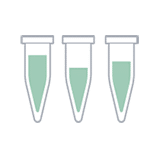ON-DEMAND WEBINAR
Overcoming the Inexpressible: How cell-free protein synthesis solved the E. coli toxicity hurdle
Introduction:
In this webinar Prof. Joleen Masschelein from VIB/ KU Leuven in Belgium, shares their experience using the eProtein Discovery platform to produce a difficult-to-express protein that has evaded all other attempts at expression. Prof. Masschelein will discuss their work on natural products produced by bacteria and the potential for new antibiotics and anticancer treatments.
The eProtein Discovery enabled the team to optimize the expression conditions for an GCN5-Related N-Acetyltransferase protein and gain insights into its antibiotic resistance mechanism. The platform provides an efficient and streamlined approach to protein expression, characterization, and purification.
Table of Contents:
Watch the replay:
About Prof. Joleen Masschelein and her lab, VIB-KU Leuven:
We study and engineer host-associated bacteria and their specialized metabolites for in vivo therapeutic and agrochemical applications. We are particularly interested in discovering new bioactive natural products from host-associated bacteria elucidating unusual pathways for natural product biosynthesis unravelling the ecological role and mode of action of natural products microbiome engineering for the production of high-value natural products and other therapeutic applications
Our work is multidisciplinary, combining molecular microbiology, synthetic biology, structural biology, metabolomics, enzymology, bioinformatics, analytical chemistry and chemical synthesis.
Prof. Joleen Masschelein
Biomolecular Discovery & Engineering
Vlaams Instituut voor Biotechnologie/ KU Leuven
Overcoming the inexpressible: How cell-free protein synthesis solved the E. coli toxicity hurdle
The worldwide emergence of antimicrobial resistance poses a significant threat, hindering the effectiveness of commonly used antibiotics against prevalent bacterial infections. Exploring the molecular mechanisms responsible for antimicrobial resistance holds great promise in tackling this global health crisis.
Identification of a novel GNAT enzyme involved in zeamine resistance
In a webinar hosted by Nuclera, Professor Jolene Masschelein from VIB/KU Leuven shared her team's journey using Nuclera's eProtein Discovery™ system to study antibiotic resistance in Serratia, a bacterial genus responsible for opportunistic and nosocomial infections.
Specifically, by examining different strains of Serratia bacteria, Prof. Masschelein’s group, identified a gene encoding GCN-5 related N-acetyltransferase (GNAT), an enzyme which confers resistance to zeamine, a class of broad-spectrum antibiotic that works by disrupting the integrity of bacterial cell membranes.
Overexpression-induced toxicity presents a challenge for E. coli expression systems
To investigate the mode of action behind GNAT’s antibiotic resistance mechanism, the team sought to overproduce and purify the enzyme for use in-vitro assays. Initially, the team attempted to produce the enzyme using a traditional E. coli expression system. Obtaining protein using E. coli requires a combination of multiple workflows such as cloning, sequencing, transformation, expression, and purification. This can be difficult and time-consuming and is constrained by cost, labor and throughput. After trying numerous E. coli strains, different expression hosts, affinity tags, and purification conditions for over six months the team was unable to obtain soluble protein for downstream applications. Additionally, cytotoxicity caused by GNAT overexpression was found to be one of the main issues impacting successful protein expression using E. coli.
Successful GNAT expression and purification using the eProtein Discovery™ system
Cell-free protein synthesis (CFPS), proved to be invaluable for the production of GNAT - normally toxic to E. coli. This is the first time this specific enzyme has been successfully expressed using Nuclera’s eProtein Discovery™ system. eProtein Discovery™ produces functional proteins by combining up to 24 DNA constructs with 8 customizable CFPS reagents and optional additives (such as chaperones, co-factors and metal ions). Expression constructs and CFPS mixtures are simply pipetted onto a cartridge and inserted into the device. This system facilitates automated, high throughput, rapid screening of optimal expression conditions by testing 192 conditions at once. The solubility and purification yield of the best performing constructs is determined, and the winning constructs are selected for larger scale expression and purification. This entire process typically takes 48 hours, with only 2 hours hands on time. eProtein Discovery™ allowed Prof. Massachelein’s team to produce active recombinant GNAT protein and discover that the combination of an N-terminal thioredoxin tag and the presence of Acetyl-CoA yielded optimum expression of GNAT.
Following GNAT expression and purification, functional assays were performed using zeamine and Acetyl-CoA to determine the enzyme’s mode of action. Acetyl-CoA was found to be necessary for the activity of GNAT, which was ultimately confirmed to inactivate zeamine by catalyzing its acetylation. Targeting GNAT enzymes has the potential to combat antibiotic resistance to zeamines by circumventing a pathogen’s ability to acetylate and inactivate the antibiotic.
Future plans for using eProtein Discovery™ system
Moving forward, Prof. Massachelein’s team is looking to scale-up GNAT production using eProtein Discovery™, for use in downstream applications, such as time-course assays and structural studies, paving the way toward the functional characterization of the enzyme. Additionally, the group successfully used eProtein Discovery™ to produce another kind of enzyme that is notoriously difficult to manufacture: a biosynthetic enzyme responsible for the creation of ‘Ribosomally Synthesized and Post-Translationally Modified Peptides’ (RiPPs). RiPPs are a major class of natural products with a broad spectrum of bioactivities ranging from anti-infective, to anti-cancer to analgesic. Knowledge of the mechanism of action of the enzymes responsible for producing these peptides could contribute to the drug discovery process.
About eProtein Discovery
Nuclera's eProtein Discovery platform combines digital microfluidic droplet automation with cell-free protein synthesis technologies, it empowers protein scientists to identify the best conditions for expressing and purifying proteins of interest within 24 hours, all on a single consumable cartridge.
The system offers a significant advantage over traditional protein expression methods, allowing researchers to save time and resources by simplifying and automating the process. Its ability to handle multiple genes and customizable cell-free blends makes it a valuable tool for protein scientists in academia and the biopharma industry.





